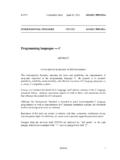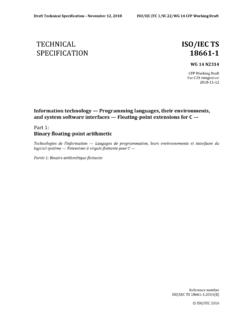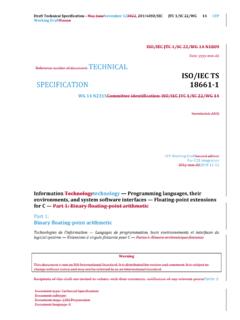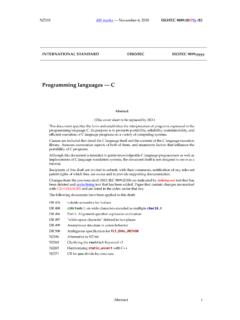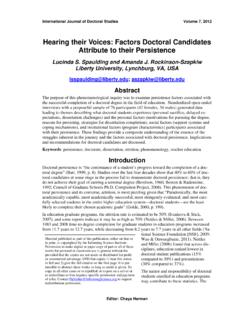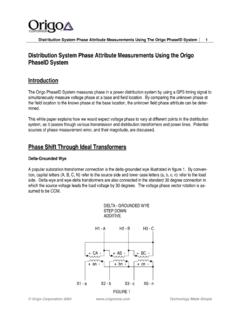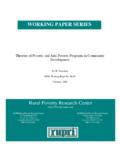Transcription of Towards support for attributes in C++ (Revision 6)
1 Towards support for attributes in C++ (Revision 6) Jens Maurer, Michael Wong Document number: N2761=08-0271 Date: 2008-09-18 Project: Programming Language C++, Core Working Group Reply-to: Michael Wong Revision: 6 General attributes for C++ 1 Overview The idea is to be able to annotate some entities in C++ with additional information. Currently, there is no means to do that short of inventing a new keyword and augmenting the grammar accordingly, thereby reserving yet another name of the user's namespace. This proposal will survey existing industry practice for extending the C++ syntax, and presents a general means for such annotations, including its integration into the C++ grammar.
2 Specific attributes are not introduced in this proposal. It does not obviate the ability to add or overload keywords where appropriate, but it does reduce such need and add an ability to extend the language. This proposal will allow many C++0x proposals to move forward. A draft form of this proposal was presented in Oxford and received acceptance in EWG to proceed to wording stage. This proposal integrates suggestions and comments from the Oxford presentation, and email conversations post-Oxford. It addresses many of the controversial aspects from the Oxford presentation and includes comprehensive Standard wordings. Specifically, it adds: Sept 15, 2008, Revision 6 Updated based on latest draft N2723 Added support for late-specified return type attributes in and Added support for enum-base attributes in added support for variadic template packed expansion through base-specifier in Clause 10 attribute -specification removed Updated with Issue 681 After Core review on Sept 16,2008 addressed comment o Moved attribute to left of statement o Refined noreturn attribute After Core review on Sept 17, 2008 addressed comment o Redrafted noreturn statement semantics o Added lambda, and other syntax support o Removed throw support June 10, 2008.
3 Revision 5 Minor fix-ups Post Core review and address core comments Feb 28, 2008, Revision 4 Expand grammar based on feedback from WG14 to accept attribute at the beginning of declarations binding to the list of declarator-ids. Added attributed bitfield support Sept 10, Revision 3: Expand on C and C++ compatibility and simultaneously publish on WG14. July 18, Revision 2: HTML cleanup allow empty attribute -lists renamed " attribute -parameter-clause" to " attribute -argument-clause", " attribute -parameter-list" to " attribute -argument-list", " attribute -parameter" to " attribute -argument" allow attribute on conversion-type-id's type-specifier-seq Toronto: introduce attribute -specification (similar to 'extern "C" { }') Toronto: integrate attributes into all keyword-based statements (except "break" and "continue"), plus "throw" Toronto: allow attributes on using-directives Toronto: add noreturn and final attributes May 4, Revision 1.
4 Empty attribute list Added Using for block scope attributes Added OpenMP control flow attribute syntax Removed support for the first attribute left class/enum/struct-key and the function return type 2 The Problem In the pre-Oxford mailing, n2224 [n2224] makes a case for extensible syntax without overloading the keyword space. It references a large number of existing C++0x proposals that would benefit from such a proposal. This paper will examine the extensible syntax mechanism through the authors experience with its implementation in an existing C++ compiler. 3 The industry s solution Most compilers implement extensions on top of the C++ Standard [C++03].
5 In order to not invade Standard namespace, compilers have implemented double underscore keywords, __attribute__(( )) [GNU], or __declspec() [MS]syntax. C# [C#] implements a single bracket system. This paper will study the __attribute__ and the __declspec syntax and make a recommendation on a specific syntax. The following are C++ entities that could benefit from attributes : functions variables names of variables or functions types blocks translation units control-flow statements 4 GNU s attribute syntax Although the exact syntax is described in the GNU [GNU] manuals, it is a verbal description with no grammar rules attached.
6 This is a qualifier on type, variable, or function. It is assumed that the compiler knows based on the attribute as to which of those it belongs to and parse accordingly. This functionality has been implemented by GCC since and various compilers which need to maintain GCC source-compatibility. IBM compiler is one of those and has implementation experience since 2001. Other compiler experience includes EDG. The description in the GCC manual is neither sufficiently specific nor complete to clearly avoid ambiguity. It is also meant to bind to C-only. There are also somewhat incorrect implementations in existing GCC compilers. But the statement described in the GCC manual does describe an intended future direction.
7 We suggest that we follow this future direction. In this paper, I will try to highlight those intended directions, describe any deviations and omissions from the manual descriptions, while giving sufficient feel for the syntax. The general syntax is: __attribute__(( attribute -list)) and: attribute -list The format is able to apply to structures, unions, enums, variables, or functions. An undocumented keyword __attribute is equivalent to __attribute__ and is used in GCC system headers. The user can also use the __ prefixed to the attribute name instead of the general syntax above. For C++ classes, here is some example of usage.
8 First, an attribute can only be applied to fully defined type declaration with declarators and declarator-id. __attribute__((aligned(16))) class Z {int i;} ; __attribute__((aligned(16))) class Y ; An attribute list placed at the beginning of a user-defined type applies to the variable of that type and not the type. This behavior is similar to __Declspec s behavior. __attribute__((aligned(16))) class A {int i;} a ; // a has alignment of 16 class A a1; // a1 has alignment of 4 An attribute list placed after the class keyword will apply to the user-defined type. This is also __Declspec s behavior. class __attribute__((aligned(16))) B {int i;} b ; // Class B has alignment of 16 class B b1; // b1 also has alignment of 16 Similarly, an attribute list placed before the declarator will apply to the user-defined type: class C {int i;} __attribute__((aligned(16))) c ; // Class C has alignment 16 class C c1; //c1 also has alignment 16 But an attribute list placed after the declarator will apply to the declarator-id: class D {int i;} d __attribute__((aligned(16))) ; //d has alignment 16 class D d1.
9 // d1 has alignment 4 When all these attributes are present, the last one read for the class will dominate, but it could be overridden individually: __attribute__((aligned(16))) class __attribute__((aligned(32))) E {int i;} __attribute__ ((aligned(64))) e __attribute__((aligned(128))); // Class E has alignment 64 class E e1; // e1 also has alignment 64 class E e2 __attribute__((aligned(128))); // e2 has alignment 128 class E __attribute__((aligned(128))) e3 ; //e3 has alignment 64 class __attribute__((aligned(128))) E e4 ; //e4 has alignment 64 __attribute__((aligned(128))) class E e5 ; //e5 has alignment 128 While an attribute list is not allowed incomplete declaration without a declarator-id, it is allowed on a complete type declaration without a declarator-id.
10 An attribute that is acceptable as a class attribute will be allowed for a tye declaration: class __attribute__((aligned(16))) X {int i; }; // class X has alignment 16 class X x; // x has alignment 16 class V {int i; } __attribute__((aligned(16))) ; // class V has alignment 16 class V v; //v has alignment 16 An attribute specifier list is silently ignored if the content of the union, struct, or enumerated type is not defined in the specifier in which the attribute specifier list is used. struct __attribute__((alias("__foo"))) __attribute__((weak)) st1; union __attribute__((unused)) __attribute__((weak)) un1; enum __attribute__((unused)) __attribute__((weak)) enum1; When an attribute does not apply to types, it is diagnosed.
